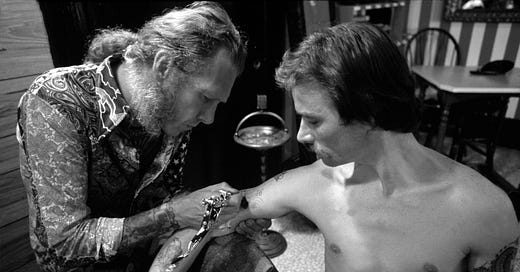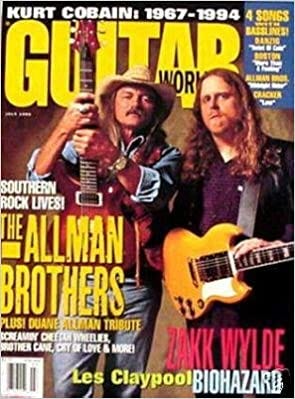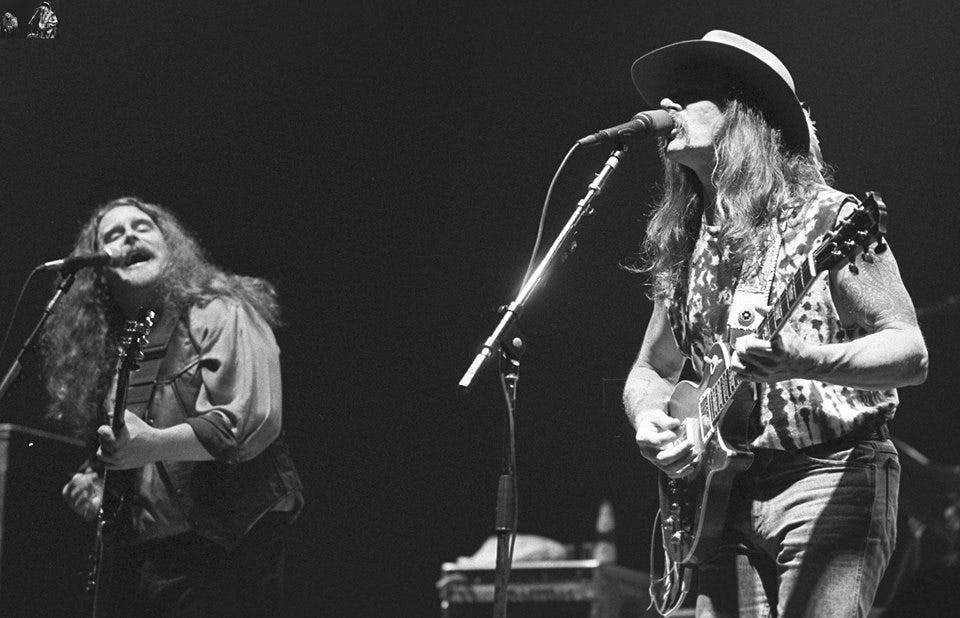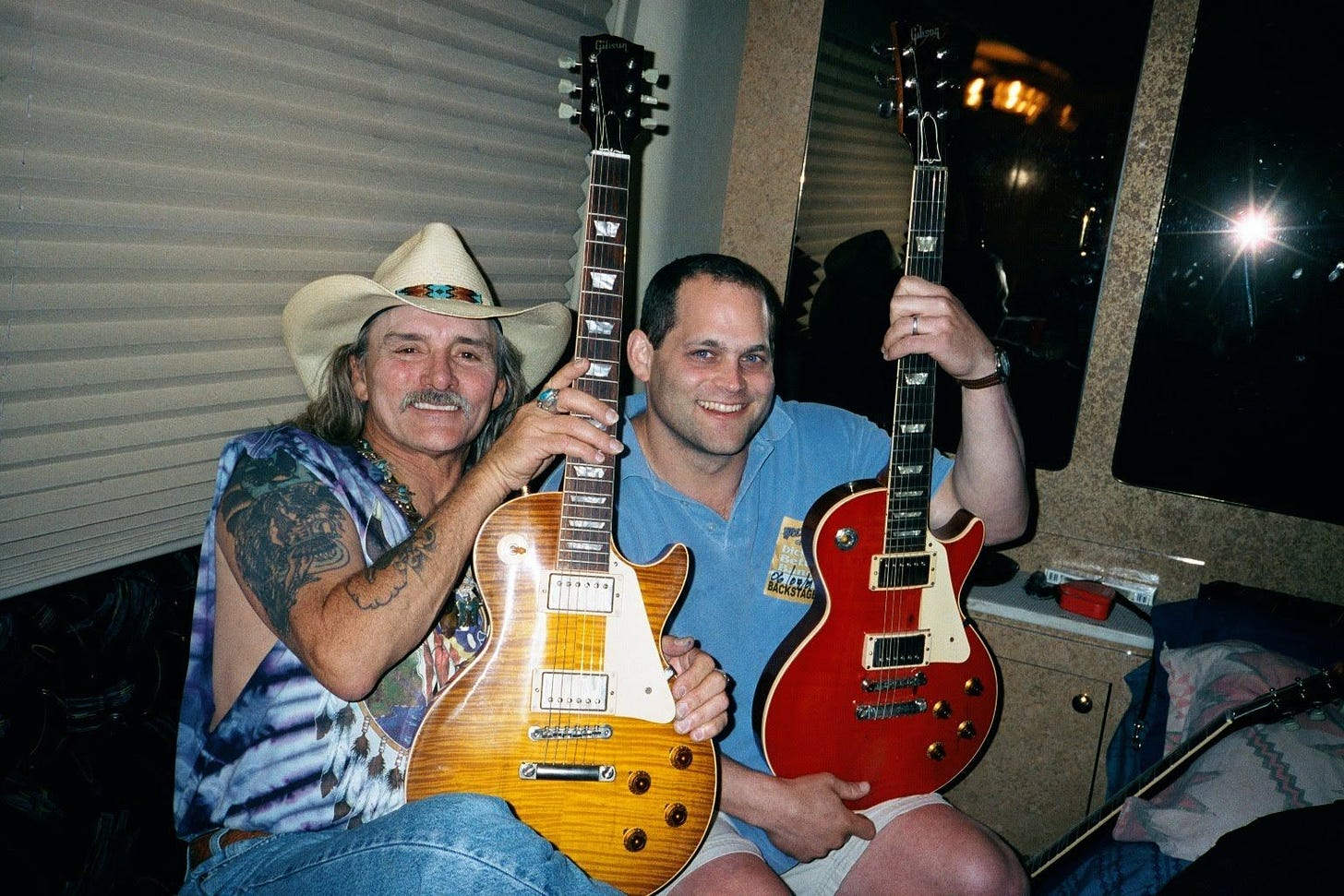Happy Birthday Dickey Betts!
Celebrating Forrest Richard Betts, lynchpin of the Allman Brothers Band sound, on his 80th birthday.
Forrest Richard “Dickey” Betts was born December 12, 1943, in West Palm Beach, Florida, and turns 80 today. Let’s mark it with an adaptation from Brothers and Sisters: the Allman Brothers Band and The Album That Defined The 70s. The book is in many ways is like a mini biography of Dickey, who stepped up in the aftermath of Duane Allman’s tragic death to help lead the Allman Brothers Band to the greatest commercial success. It’s a role that he was ill-suited for in many ways, due to his moody demeanor and habit of vanishing into himself for extended periods, and the book explores the highs and lows, which are touched on in the excerpt below.
Dickey is one of my favorite guitarists of all time, a truly unique player with a gift for both melody and improvisation, acoustic country roots and “Django Reinhardt on acid” in the memorable words of Warren Haynes. He also was key to my own ability to write so much about the Allman Brothers Band. Like Cameron Crowe two decades earlier, Dickey decided I was ok and assented to talking to me regularly and then to me being around a lot. I came to the band via Guitar World, so my first and most important relationships were with Dickey and Warren, a relationship that culminated in the July 1994 cover story (which was mercifully not pulled for a Cobain memorial issue, though I still can’t beleive we didn’t do one.)
I could write a hell of lot more about Dickey and one day I will, including the lone time that this famous temper was trained on me, an unnerving experience on a tour bus that deserves to be told. But today let’s focus on wishing Dickey a happy 80th birthday as he enjoys retirement at his beautiful waterfront home outside Sarasota.
This blog remains free for one and all and it is a word of mouth operation, so if you enjoy, please subscribe and share.
Enjoy this Spotify Playlist of some of Dickey’s finest moments that I put together this morning. What would you include that isn’t here?
From Brothers and Sisters: the Allman Brothers Band and The Album That Defined The 70s, starting with Duane allman’s formation of the Alllman Brothers Band.
Lead guitarists are like fighter pilots, surgeons, samurai warriors, or heavyweight champions—alpha beings who generally do not seek to share the spotlight or be challenged. Duane had a different idea; he wanted to see what he and Betts could do together. The two had been well established for years as the hottest guitarists in a Florida club and frat party scene that included Stephen Stills, Tom Petty, Mike Campbell, Lynyrd Skynyrd’s Gary Rossington and Allen Collins, and future Eagles members Bernie Leadon and Don Felder.
Betts’s distinctive melodic sense led him to consistently come up with memorable lines, which Duane jumped on, using his perfect pitch and technical facility to add harmony and counterpoint on the fly. This sympatico musical relationship helped create and define one of the greatest guitar partnerships in rock and roll history. Their partnership rewrote the book on how two rock guitarists could play together, a dynamic that changed popular music.
While the Second Coming excelled at playing modern, progressive rock by the likes of Cream and Jefferson Airplane, Betts had a broad musical range that extended in multiple directions. He had a deep affinity and talent for the acoustic blues of Robert Johnson and Blind Willie McTell and could play urban electric blues with vigor and authenticity. He was also deeply grounded in western swing and jazz, loved country guitarist Roy Clark and jazz pioneers like Charlie Christian and Django Reinhardt, and had a family background in acoustic string music. He played ukulele and fiddle and was even a member of a banjo group long before he ever picked up an electric guitar.
Like Duane, Dickey did not graduate high school, literally running away to join the circus at age sixteen, playing fifteen thirty-minute shows a day on state fair midways, performing Little Richard and Chuck Berry songs while doing duck walks and splits and sitting atop bandmates’ shoulders. “The barker would introduce us and lure people in by spinning outrageous lies, like we had been on the Ed Sullivan show and were about to be stars,” Betts recalled with a laugh.
Betts’s time in this band helped him hone his chops and paid him an excellent salary of $125 a week. When that gig ended, Betts made his way to Indiana to play with the Jokers, a hot band on the midwestern circuit that Rick Derringer memorialized in “Rock and Roll, Hoochie Koo” (“There was a group called the Jokers, they were layin’ it down”).
Betts’s personality was as complex as his musical background. He was a tightly coiled athlete with a mighty temper as well as a student of Zen Buddhism and karate, which he used to channel and control compulsiveness, anger, and occasional violent urges. More than once, an audience member made the mistake of making sexual advances at Betts’s wife, Dale, the Second Coming’s singer, only to find themselves in a crumpled heap at set break, when Dickey would leap off the stage, pummel the catcaller, and then calmly retreat backstage to relax with a beer. Despite such behavior, he was also a true believer in the hippie ethos of the era and would go on to write some of the most peaceful, joyful songs in the rock canon, including “Revival,” “Blue Sky,” and “Jessica.”
Betts could be quiet and thoughtful, expounding on Zen Buddhism, jazz, architecture, or country music, and he could disappear into his thoughts, vanishing behind a blank gaze that unnerved people.
“Dickey’s a real Charles Bronson type,” Gregg Allman said. “It doesn’t take long after you meet the guy to realize that there are things he knows about himself that you’ll never know, so don’t even get close to his space. Which is fine. He’s a very intricate guy, Dickey Betts.”
Every aspect of Betts’s multifaceted musical background and Jekyll and Hyde personality would eventually be evident in his playing, which formed a large part of what came to be the Allman Brothers Band sound. Betts had a genius for inserting bluesgrass-type melody into blues and rock songs. His melodic ideas were also shaped by a strong rhythmic drive. As a kid, he dismantled banjos to create a drum set out of the heads, and he never lost his interest in percussion, practicing drum rudiments for years.
“Dickey was a pretty good drummer,” said Jaimoe. “When he had ideas for drum parts, I’d just ask him to sit down and play it.”
Betts had the ambitious goal of creating a singularly unique [CE6] voice on the guitar, remaining rooted in the blues without mimicking the masters’ ideas and licks. “I tried to use as much of the instrument’s scope and range that was outside of the blues form and tie it in with the motions and feeling of the blues,” said Betts.
From the beginning of the band, Dickey’s fits of rage and the dark melancholy that could surround him in an intimidating bubble were issues that the other members had to contend with.
Betts’ rage was almost always triggered by cocaine and alcohol, which could turn him from pleasant, engaged and friendly into frighteningly violent on a moment’s notice. “He’s so bright, but chemicals give him a problem,” manager Phil Walden said. “They turn him into this redneck guy who he really isn’t.”
The guitarist would vanish into a fog for several nights in a row, leaving the band in a precarious position, with everyone trying to cover for the giant hole at center stage. Then he would snap out of his funk and play like the greatest guitarist in the world - which he arguably was in this era. When he was on top of his game, Dickey’s playing was absolutely breathtaking, covering the wide gamut of his experiences and skills from blues to country to “Django Reinhardt on acid” in the memorable words of Warren Haynes. On those nights, Betts would take audiences for a ride, locked into the rhythm section, buoyed by Gregg’s organ and in constant conversation with Leavell’s piano.
Betts himself described the experience of being lost in the music beautifully to writer Tom Nolan: “The energy level on that stage, the intensity of concentration, is so heavy that in the midst of something like that you can look at a guy and tell what he is thinking. I can look at Chuck and tell if he thinks I’m really playing or really not playing or just showing off, or if he’s jealous. And he can [tell] with me, too. We all can. If you see one dude who keeps thinking a bad thought you pull him aside and say ‘Come on man, forget that bullshit. Let’s get on up and get over there and do something nobody else can do.’”
“And we do it. When that music starts happening, mister, there’s some real power there. And it don’t have nothing to do with how you comb your hair or what you wear. It has to do with how much you can get with whoever you’re with on that stage, with how much you love and understand them…. No smoke bombs. No glitter. Just guitars, pianos, voices. It’s just a real human thing.”
Excerpted from Brothers and Sisters: the Allman Brothers Band and The Album That Defined The 70s, copyright Alan Paul, 2023.
Alan Paul’s fourth book, Brothers and Sisters: the Allman Brothers Band and The Album That Defined The 70s, will be published July 25, 2023, by St. Martin’s Press. His last two books – Texas Flood: The Inside Story of Stevie Ray Vaughan and One Way Out: The Inside History of the Allman Brothers Band – debuted in the New York Times Non-Fiction Hardcover Bestsellers List. His first book was Big in China: My Unlikely Adventures Raising a Family, Playing the Blues and Becoming a Star in Beijing, about his experiences raising a family in Beijing and touring China with a popular original blues band. It was optioned for a movie by Ivan Reitman’s Montecito Productions. He is also a guitarist and singer who fronts two bands, Big in China and Friends of the Brothers, the premier celebration of the Allman Brothers Band.









What a character and what a talent! Maybe the most complex of the Brothers? Zen-like, poetic, lyrical and beautiful compositions, soaring and searing solos and the, uhh, unpredictable demeanor? I loved seeing Dickey play and did many times including his early solo tour at NY’s famed Bottom Line and outdoor shows. I wanted to meet him and came close on two occasions including backstage only to be told - or warned - (in so many words), “I wouldn’t go there right now.” Ha! I always felt that Berry was Duane’s musical soul-brother (and friend), but without Dickey, there is no eternal legacy of their on-fire greatness. Duane needed Dickey and his future stewardship of the band can never be discounted. Happy Birthday, Dickey!
"I could write a hell of a lot more about Dickey and one day I will ..." reminds me of the email exchange you and I had back in the summer of 2021. I had written you to express my fervent hope that you and Andy Aledort might collaborate again to do a long overdue biography of Dickey Betts. Your gracious replies included information on the work in progress that culminated in "Brothers And Sisters" and reasons that it was not feasible at that time to pursue a Betts' book. I still hope that someday that project will happen. In the meantime, Happy Birthday, Dickey and thanks, Alan, for all the work you've done and continue to do to further the legacy of this band. I've read "Brothers And Sisters" twice now and turned a number of people on to this masterful work. Wishing you continued success and a wonderful holiday season.